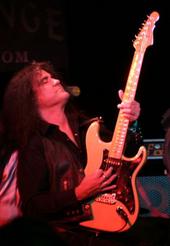The thundering, screaming wail of a black Les Paul, and the soulful
leathery vocals of a road veteran; these are hallmarks of rock guitarist
and singer Steve Cenker. Twenty years of writing, recording and
performing are evident in every lovingly tortured note from his guitar,
every heart-stabbed phrase from his lungs.
Though he was born in the quiet hills of West Virginia, Steve could hear
the echo of loud guitars drawing him to the road and the big city. He
was only eleven when he attended his first concert, witnessing the
smooth style of REO Speedwagon guitarslinger, Gary Richrath. Awestruck
with the authority and musicianship that a guitarist can display, Steve
immediately bargained to obtain his first guitar, a $60 Harmony electric
from Sears. He wore blisters in his fingers while burning through the
various popular rock songs of the day
Things changed suddenly, though, when Cenker discovered a band called
Deep Purple. Being his first exposure to the guitar-centered mayhem of
hard rock and metal, Steve turned his focus toward this harder edged
style and found it suited his deep need to tell stories through 6 silver
strings and a thundrous grind.
As early as 1985, he was recording his first demo with a band called Legend. This was the beginning of his personal love of the recording process, as well. Little did he realize, the studio would soon come to be his second home.
Realizing that West Virginia was far away from the music business that
called him, Cenker relocated to Orange County, California in 1987. After
networking with locals in the music scene, Steve landed a position as
guitarist for Malteze, an L.A. based metal band signed to Gold Records.
This was late 1989, and by 1990, Malteze was in tight enough form to
record their first full-length album called "Count Your Blessings."
Released worldwide, the band obtained a following that is still faithful
to this day, though they have long since disbanded. The breakup happened
in 1992, during the making of their follow-up CD, when tensions in the
studio ran high and disagreements in direction caused a rift that could
not be healed.Steve continued with studio work while drifting through various
projects, including a cover band named Slider that was instrumental in
pushing him to adopt more varied styles and methods of improvisation. He
was now feeling confident to attack a whole new project; one that was
centered on his personal vision of what a hard rock band should be.Through club and musician contacts, Cenker found a tall, gangly drummer
named Bart Robley. Robley, also a current L.A. transplant, from
Colorado, shared Cenker's small-town mentality and his hunger for a
career playing hard rock. Together with local A.J. Schad on bass guitar,
this 3-piece thundered onto the music scene as War Crime.Eager to get his music to the audience, Cenker decided to forego the
usual introductory studio album and, in 1995, compiled early club
performances of War Crime onto a CD called 'LIVE." Locals hungry for a
new sound had found it in this collection of leather-clad, armored metal
anthems.War Crime toured endlessly, building an audience that was eager to hear
more from this triad of metal warriors. By the end of 1996, it was due
time to give something new to the audience, and War Crime invaded the
studio to record a load of brand new tracks. Released in 1997 on Black
Wall Records, War Crime's "No Escape" album, in all its raw glory, was
an underground hit in Los Angeles, and received rave reviews in Europe,
garnering extensive airplay and a huge overseas audience.As with all things, by 1998, War Crime had seen the departure of bassist
A.J. Schad, and though he was temporarily replaced, Cenker and Robley
decided to lay their metal beast, War Crime, to its final rest. The two
remaining members parted ways, but stayed in constant contact, relaying
their musical stories and woes along the way.It was this deep friendship between Cenker and Robley that kept their
personal musical fires fueled, and they helped push each other forward,
though no longer playing together. Steve had returned to studio and
cover band work, and Robley was working with southern rockers, The Sam
Morrison Band. Through Robley's recommendation, Cenker was invited
on-board the fully-restructured Sam Morrison Band to play hard edged
Southern Rock. With his metal sensibilities and his raw sound and
vocals, the Sam Morrison Band became a whole new animal...not Southern
Rock, not Hard Rock, but a melodic mix of power and soul somewhere in
between the two styles.2002 saw the release of the first full-length album from a
re-invigorated SMB. Solid reviews and packed houses are a testament to
the new sound that is already a favorite at biker events and venues and
working its way into the main public bloodstream. After tour support for
the 2002 release, SMB has returned to the studio to tell some new
stories about life on the road and the mysterious dark of the southern
swamps.Steve continues his own personal vision by writing and producing his own
music, most recently compiled on an album called "Dissolution," a title
which obviously reflects the ever-changing nature of an artist. We have
seen Cenker grow and change with each musical adventure, and on his new
album, we hear the depth of emotion that one man and a guitar express in
a world of hard roads and directions to choose.RIP Randy Rhoads 25 yr anniversary
Add to My Profile | More Videos
